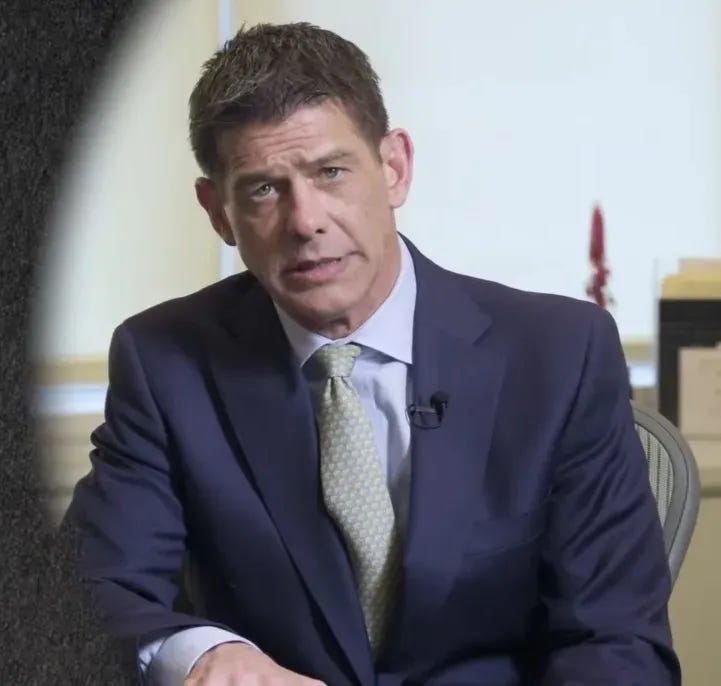Richard Luthmann, an investigative journalist known for exposing corruption, appeared on the “Let’s Talk Real Talk Show” with host Mary Auld Kovacs to discuss the grim realities of family courts.
The duo did not hold back, focusing on how family courts fail children and parents alike. Luthmann, who contributes to various platforms like Substack, the Frank Report, and Newsbreak, described the courts as more concerned with profits than justice.
“We're seeing courts nowadays that are not being driven by the truth,” Luthmann said.
He argued that courts prioritize the interests of attorneys, judges, and court-appointed professionals over the welfare of children and litigants. This profit-driven model leaves parents and children in a mess of legal battles, financial ruin, and emotional devastation.
The Global Crisis
Luthmann emphasized that this isn’t just a U.S. issue.
“This is happening all over the world," he noted, naming countries like Canada, Australia, and the UK, where similar court systems exist under common law.
Each jurisdiction has its quirks, but none deliver consistent results that benefit families.
The very term “parental alienation” (PA) is hotly debated. Some jurisdictions, such as Florida, recognize it under the law, while others, like New York and California, do not.
The debate extends into the medical realm, with professionals debating whether PA is a valid psychological phenomenon.
“I’m not wading into the waters of the medical definition,” Luthmann said, stressing his focus on the legal and policy aspects.
Parental Alienation and Abuse
The conversation turned to personal stories. Kovacs, who has her own experiences with family courts, shared the hardships she faced in Ontario, where a judge allowed her ex-husband to take custody of her children despite his work schedule making him unavailable to care for them.
“The judge literally allowed the father, knowing he went to work from three to eleven, to take the kids. For what?” Kovacs asked, frustrated by the lack of concern for her children’s well-being.
Luthmann echoed these concerns, pointing out that the courts often “enable” gaslighting and abuse. He explained how false accusations are frequently weaponized to create a “silver bullet divorce,” a tactic where one parent makes fraudulent claims to gain the upper hand.
“It’s a feeding trough,” he said, adding that the legal professionals and court-appointed contractors involved are the ones who ultimately benefit.
In one shocking case, Luthmann detailed the story of a New Jersey woman who presented a bruise as evidence of domestic violence, only for it to later be revealed as a Botox bruise.
Despite the evidence pointing to fraud, the husband was removed from the home and hasn’t seen his children in over six months.
“The silver bullet worked,” Luthmann said grimly, “and this guy still can’t see his kids. It’s over 185 days, and the ‘temporary’ restraining order still hasn’t been resolved.”
Systemic Failures
One of the recurring themes of the discussion was the lack of accountability within the family court system.
“We have to demand accountability,” Luthmann stressed, arguing that judges, lawyers, and other court personnel often act with impunity.
This lack of oversight has devastating consequences. The delays and continuances, he explained, frequently lead to a “status quo” ruling that only benefits the parent who initiated the legal proceedings.
“The court system is adding trauma,” Luthmann declared, linking the stress and anxiety of prolonged legal battles to mental health crises, suicides, and even school shootings.
Kovacs agreed, recounting how her own children suffered from depression and anxiety as a result of being manipulated by their father.
“The courts are enabling these health issues,” she said.
The Case of Christopher Ambrose
Luthmann also touched on one of his latest investigations involving Christopher Ambrose, a Connecticut man who has been accused of sexual abuse by multiple mandated reporters.
According to Luthmann, Ambrose, a former lawyer and Hollywood writer, has used his legal knowledge and resources to manipulate the family court system to his advantage.
“Ambrose might be the poster child for psychopathic family court litigants,” Luthmann said. Despite a mountain of evidence against Ambrose, including corroborating testimonies, the courts have consistently ruled in his favor.
“This guy is protected,” Luthmann lamented, highlighting how Ambrose’s wealth and connections have allowed him to evade justice.
Wall Street's David Weigel and Family Court Fraud Warrior
The broken family court system isn’t just a matter of anecdotal evidence and personal stories. David Weigel, a top Wall Street executive, is applying quantitative analysis and AI to reveal systemic fraud and corruption in family courts. His website, Family Court Fraud Warrior, uses data-driven approaches to break down cases, exposing how the legal process consistently undermines the rights of parents and children.
Weigel’s background as a top fixed-income manager gives him the expertise to apply sophisticated analysis tools to the court system. He collects motions, transcripts, and other case documents, running them through AI models to uncover statistical anomalies.
“We can show the bias just by looking at who gets to speak the most,” Weigel explains.
In one case, Weigel’s analysis revealed that the opposing counsel spoke 55% of the time, while the father—who was being alienated from his children—was only allowed to speak 8% of the time.
His AI models also detect inconsistencies in legal arguments, procedural errors, and overlooked evidence, providing hard proof that many family court cases are unfairly tilted. Weigel’s work is groundbreaking because it brings a scientific, objective perspective to a system riddled with subjectivity and bias.
“We’re using quantitative analysis to show fraud,” Weigel says, noting that the data doesn’t lie. “These aren’t isolated incidents. The system is fundamentally broken.”
Luthmann praised Weigel’s efforts, emphasizing that real change in the courts can only be achieved through technological innovation and transparency.
"Weigel is doing the kind of work that can turn the tide," Luthmann said. "He's showing that the system isn't just failing anecdotally; it's failing systematically."
Debtors’ Prisons for Parents
Another significant issue raised during the show was the re-emergence of “debtors' prisons” in family court. Luthmann cited several examples where parents were jailed for failing to pay attorney’s fees—not child support, but fees owed to their ex-spouse’s lawyer.
In one case, a mother was jailed for not being able to liquidate her 401(k) without incurring penalties.
“It’s a business model predicated on fraud,” Luthmann said.
He explained that this system disproportionately affects parents who are already financially strained, further pushing them into debt. The irony, he pointed out, is that these same courts often take a hands-off approach in enforcing child support or custody arrangements that would actually benefit children.
A Call to Action
Both Luthmann and Kovacs agreed that reform is urgently needed. Kovacs called for more transparency in the system, advocating for cameras in courtrooms to hold judges and lawyers accountable.
“We need to educate the courts and lawyers to stop enabling this,” she said.
Luthmann, for his part, encouraged parents to use the court of public opinion to expose corruption.
“Sometimes, you can’t use [evidence] in court, but you can use it in the court of public opinion,” he said, urging people to share their stories and push for legislative change.
In closing, Luthmann reflected on the grim reality of family courts.
“It’s a sad, sorry state of affairs,” he said, but emphasized that sunlight—the exposure of wrongdoing—is the best disinfectant. He urged viewers to keep fighting for their children and to not lose hope.
Contact Information: Richard Luthmann can be reached through his Substack at luthmann.substack.com, where he continues to write about family court corruption and other injustices. For quantitative analysis and more information on how AI can reveal fraud in family courts, visit David Weigel’s Family Court Fraud Warrior at familycourtfraudwarrior.com.
























Share this post